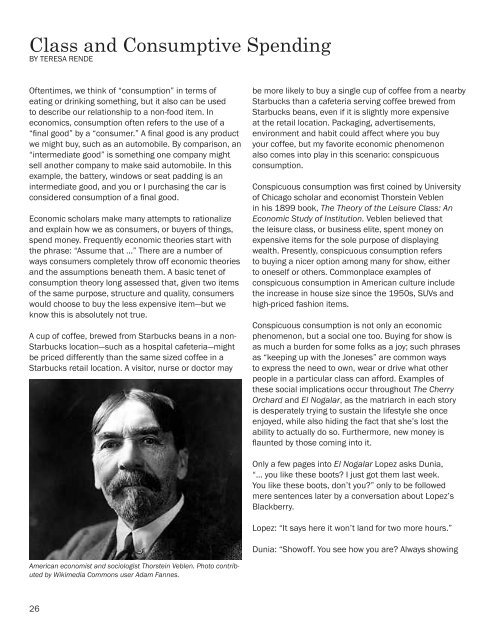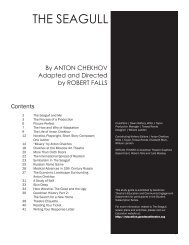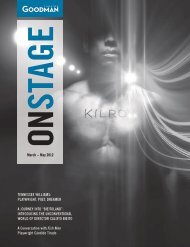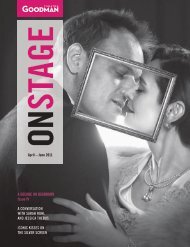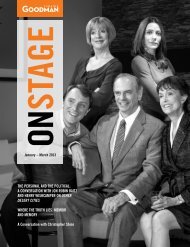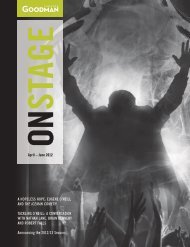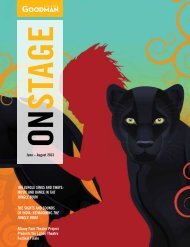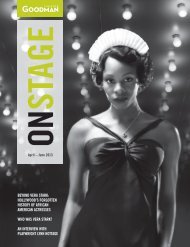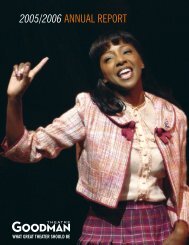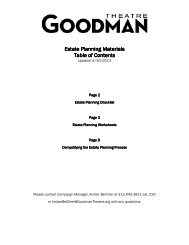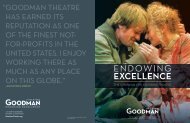El Nogalar Study Guide (9MB) - Goodman Theatre
El Nogalar Study Guide (9MB) - Goodman Theatre
El Nogalar Study Guide (9MB) - Goodman Theatre
You also want an ePaper? Increase the reach of your titles
YUMPU automatically turns print PDFs into web optimized ePapers that Google loves.
Class and Consumptive Spending<br />
BY TERESA RENDE<br />
Oftentimes, we think of “consumption” in terms of<br />
eating or drinking something, but it also can be used<br />
to describe our relationship to a non-food item. In<br />
economics, consumption often refers to the use of a<br />
“final good” by a “consumer.” A final good is any product<br />
we might buy, such as an automobile. By comparison, an<br />
“intermediate good” is something one company might<br />
sell another company to make said automobile. In this<br />
example, the battery, windows or seat padding is an<br />
intermediate good, and you or I purchasing the car is<br />
considered consumption of a final good.<br />
Economic scholars make many attempts to rationalize<br />
and explain how we as consumers, or buyers of things,<br />
spend money. Frequently economic theories start with<br />
the phrase: “Assume that …” There are a number of<br />
ways consumers completely throw off economic theories<br />
and the assumptions beneath them. A basic tenet of<br />
consumption theory long assessed that, given two items<br />
of the same purpose, structure and quality, consumers<br />
would choose to buy the less expensive item—but we<br />
know this is absolutely not true.<br />
A cup of coffee, brewed from Starbucks beans in a non-<br />
Starbucks location—such as a hospital cafeteria—might<br />
be priced differently than the same sized coffee in a<br />
Starbucks retail location. A visitor, nurse or doctor may<br />
be more likely to buy a single cup of coffee from a nearby<br />
Starbucks than a cafeteria serving coffee brewed from<br />
Starbucks beans, even if it is slightly more expensive<br />
at the retail location. Packaging, advertisements,<br />
environment and habit could affect where you buy<br />
your coffee, but my favorite economic phenomenon<br />
also comes into play in this scenario: conspicuous<br />
consumption.<br />
Conspicuous consumption was first coined by University<br />
of Chicago scholar and economist Thorstein Veblen<br />
in his 1899 book, The Theory of the Leisure Class: An<br />
Economic <strong>Study</strong> of Institution. Veblen believed that<br />
the leisure class, or business elite, spent money on<br />
expensive items for the sole purpose of displaying<br />
wealth. Presently, conspicuous consumption refers<br />
to buying a nicer option among many for show, either<br />
to oneself or others. Commonplace examples of<br />
conspicuous consumption in American culture include<br />
the increase in house size since the 1950s, SUVs and<br />
high-priced fashion items.<br />
Conspicuous consumption is not only an economic<br />
phenomenon, but a social one too. Buying for show is<br />
as much a burden for some folks as a joy; such phrases<br />
as “keeping up with the Joneses” are common ways<br />
to express the need to own, wear or drive what other<br />
people in a particular class can afford. Examples of<br />
these social implications occur throughout The Cherry<br />
Orchard and <strong>El</strong> <strong>Nogalar</strong>, as the matriarch in each story<br />
is desperately trying to sustain the lifestyle she once<br />
enjoyed, while also hiding the fact that she’s lost the<br />
ability to actually do so. Furthermore, new money is<br />
flaunted by those coming into it.<br />
Only a few pages into <strong>El</strong> <strong>Nogalar</strong> Lopez asks Dunia,<br />
“… you like these boots? I just got them last week.<br />
You like these boots, don’t you?” only to be followed<br />
mere sentences later by a conversation about Lopez’s<br />
Blackberry.<br />
Lopez: “It says here it won’t land for two more hours.”<br />
Dunia: “Showoff. You see how you are? Always showing<br />
American economist and sociologist Thorstein Veblen. Photo contributed<br />
by Wikimedia Commons user Adam Fannes.<br />
26<br />
<strong>El</strong><strong>Nogalar</strong>.indd 26<br />
3/25/2011 4:05:40 PM


